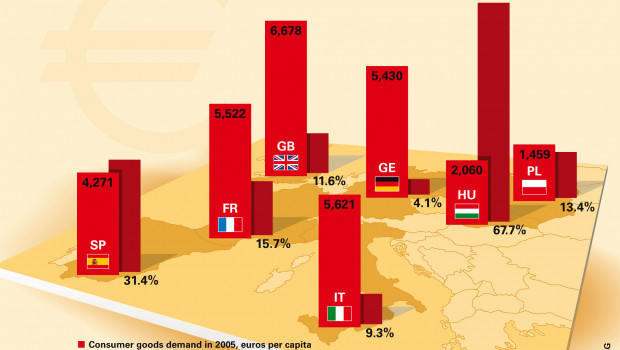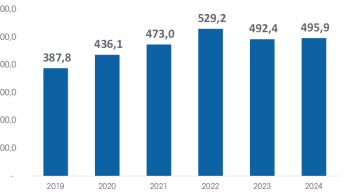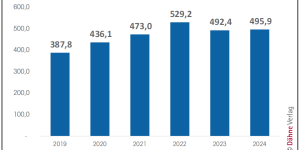Metro Group publishes first pan-European study on private consumption
The study shows that, although the European Union is the largest economic zone in the world in terms of gross domestic product, the Americans are the world champions of consumption. Whereas more than 450 mio Europeans spend an annual amount of roughly € 6.3 trillion for their personal needs, 299 mio US citizens attain a consumption volume of around € 7 trillion.
Within Europe the British are the greatest spenders. In 2005, they spent around € 6 700 per capita on consumer goods. The Italians achieved a per capita consumption of € 5 600, followed by the French with € 5 500. The Germans ranked fourth with nearly € 5 400. The Hungarians came in at just under € 2 100 and the Polish at € 1 500. But the difference relative to the West is dwindling, because these countries post high growth rates in the demand for consumer goods.
31 per cent of the British interviewees indicated that they “sometimes also live beyond their means”. In Germany, this statement was only confirmed by 12 per cent of the consumers. 52 per cent of the German interviewees say that they “cannot sleep in peace with debts”. In Hungary, this statement was affirmed by 62 per cent of all interviewees, while in Great Britain it only holds true for 29 per cent of the respondents.
The study confirmed one common concept: German consumers are the most price-conscious. 55 per cent of the interviewees declared: “I compare prices even on minor purchases.” In Great Britain, the proportion was only 39 per cent.
The greatest shoppers in Europe are the Polish. 38 per cent of the interviewees declared: “I really enjoy shopping.” In Germany, this statement was only confirmed by 24 per cent of the respondents. 33 per cent of the German citizens said: “I spend my money very reluctantly.”
This notwithstanding, the Germans are not pessimistic. Quite the opposite: 69 per cent of the interviewees confirmed the statement: “I am satisfied with my life.” No other nation in Europe achieved such a high value in this study. The Spanish came in second with a 66 per cent approval rating. The back-marker in Europe is Hungary, where only 47 per cent of the interviewees supported this view. The Spanish are particularly sceptical about the future. 58 per cent of the interviewees affirmed the statement: “I am very worried about the future.” In Poland, the result was 53 per cent and in France 48 per cent. In Germany, 41 per cent of all citizens view the future with concern. In Great Britain, by contrast, such concerns were only entertained by 29 per cent.
One of the major reasons why the Germans are not so keen on consuming lies in the uncertainty about the future of the social systems. 81 per cent of the interviewees subscribed to the view: “I have to save more for my old age than I had previously thought.” This percentage is by far the highest in Europe. The Italians came in second with 71 per cent. The lowest approval rate for this statement was recorded for the Spanish with 54 per cent.
Another question clearly illustrates why the British consume much more than for example the Germans. 33 per cent of the British confirmed the statement: “Our country is in good economic shape.” In Germany, this was only affirmed by a mere 20 per cent of the population, in Italy by only 10 per cent and in Hungary by as little as 7 per cent.
Overall the survey, which represents the first comprehensive study of this type, identified a wealth of common ground regarding the attitudes and expectations for the future of consumers. At the same time it also showed differences in growth and prosperity as well as in actual consumer behaviour.
The Metro Group commissioned the Wissenschaftliche Hochschule für Unternehmensführung (WHU) in Koblenz to carry out the survey of consumer behaviour in Europe. In representative countries for this economic region, i.e. in Germany, Great Britain, France, Spain, Italy, Poland and Hungary, which generate 80 per cent of the EU’s gross domestic product, the WHU conducted a secondary analysis of macroeconomic data as well as of budget and consumption-related factors. The results were then linked to the results of a representative consumer survey conducted by the market research institute TNS Infratest in March 2006. In each country 1 000 people were interviewed. The Metro Group plans to repeat this survey at regular intervals.
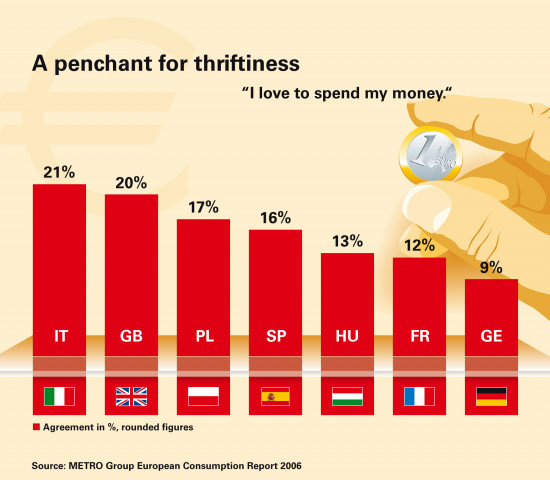
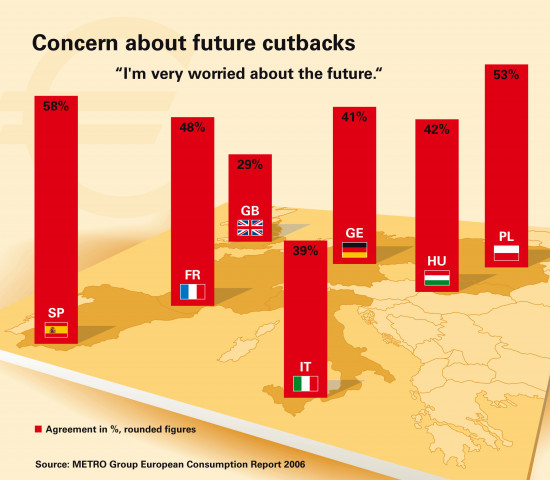
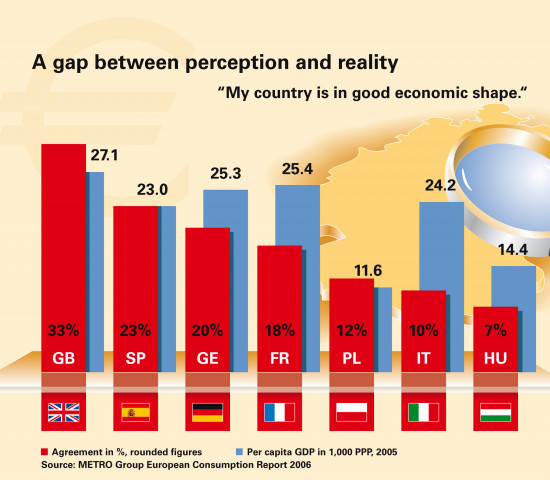

 Menü
Menü




